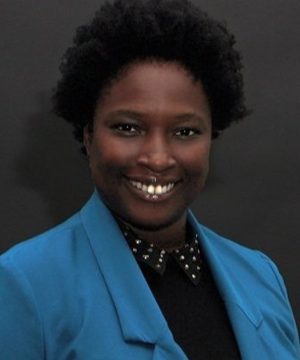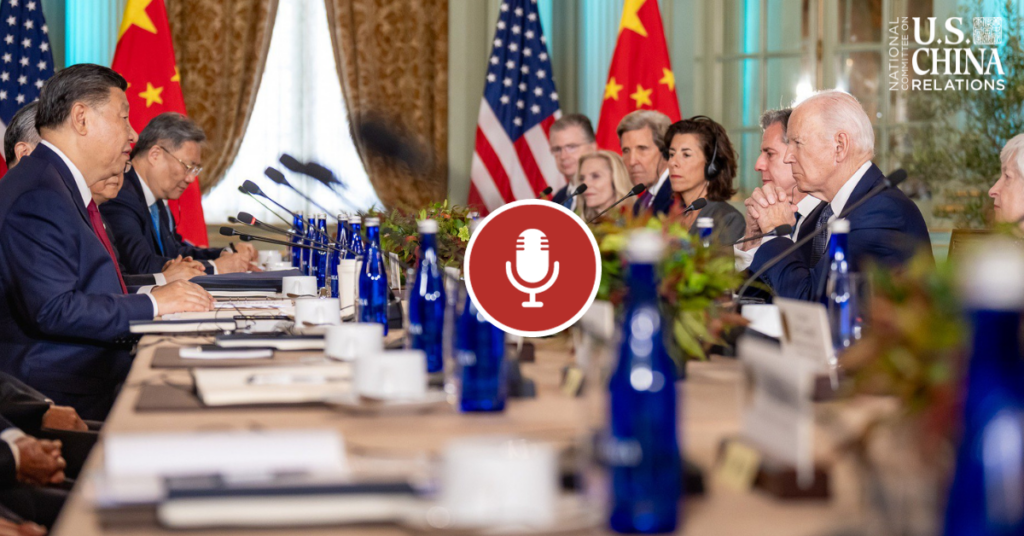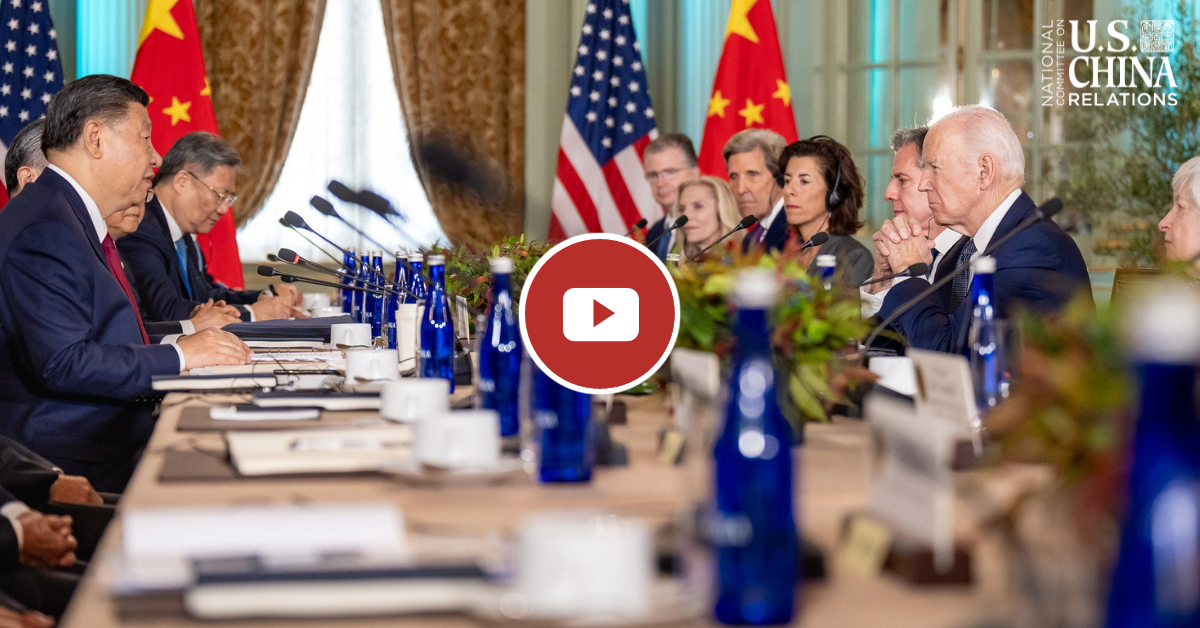U.S. President Joseph Biden and Chinese President Xi Jinping met on the sidelines of the APEC summit in San Francisco on November 15, 2023. After what Biden referred to as “some of the most constructive and productive discussions we’ve had,” the two leaders separately announced progress on key issues including combatting the global drug trade, resuming military-to-military communication, importance of people-to-people dialogue, and the need to address AI risks. But flashpoint issues, such as wars in Europe and the Middle East, human rights, and cross-Taiwan Strait tensions remain unresolved.
Following the summit, how will U.S.-China relations evolve over the coming months? In an interview filmed on November 17, 2023, analyst and linguist Titilayo Ogundele joins the National Committee to discuss the impact of Xi’s visit and what we can expect to happen in the bilateral relationship.
Speaker

Titilayo Ogundele
Titilayo “Titi” Ogundele is a foreign affairs analyst and Chinese linguist specializing in U.S.-China relations, Indo-Pacific security, and threat analysis.
In 2022, she founded LAYO Consulting, providing geopolitical analysis and Chinese linguist services. Highlights of Titilayo’s professional experience include: working in Diplomatic Security and Consular Affairs at the US.. Department of State, analyzing China’s Belt and Road Initiative (BRI) at the US Agency for International Development (USAID), supporting domestic energy projects at the Bipartisan Policy Center, and conducting China and Indo-Pacific security research at the Center for Naval Analysis.
Titilayo holds an MA in International Relations from Syracuse University and a BA in Political Science and Chinese Studies from SUNY Albany.
Titilayo Ogundele: My name is Titilayo Ogundele. I’m a foreign affairs analyst and linguist, as well as the founder of LAYO Consulting.
What are the main takeaways from President Xi and Biden’s meeting?
Titilayo Ogundele: Well, I think the biggest takeaway is that the meeting even happened. Even to the casual observer, anyone who knows anything about the U.S.-China relationship, their awareness has been pretty frigid to put into a lack of better terms if you will. So the fact that, you know, Chairman Xi came here to the U.S. and met with President Biden face to face is a big step. You know, a lot of people I’m sure were anticipating some really big changes — kind of a showdown if you will — especially considering all the things that have culminated over the last year and really several years.
You know, this is the first time Xi has been in the U.S. in 2017 back during the previous administration with the trade wars, so this is a big step. It looks as though the U.S. and China are both leaning into each other positively. Whether reluctantly or not remains to be seen, but I think that’s the main takeaway there.
In regards to wins, I think for the Biden administration, the reestablishing of military ties is a big win for us. There’s been a lot of missteps, miscommunications, close calls especially with maritime security in the Indo-Pacific, so that is huge in that regard. And then of course for China, a big win is a reassurance of the One China policy and having it kind of come from the horse’s mouth that the United States government is still adhering to that. So those are kind of the three big things I took from the meeting.
How was Xi’s visit received in America by Americans?
Titilayo Ogundele: So, you know, from what I’ve been seeing it’s kind of been, it’s been good and bad, right? So obviously the U.S. and China, they’re leaning into each other a little more positively, a little bit more on the cooperation side than competition side, which is great for the business community, right? So, you know, Chairman Xi had attended a a dinner on Wednesday with some executives from the business community and was received very well, so that’s a good sign in that aspect.
But of course, you know, in terms of the American people and policy makers, there’s always been this need for us to be hard on China. This is something we’ve seen across many different administrations. So we’re going into an election year, China has been pegged as a boogeyman for some time in any topic or debate when it comes to our foreign policy. So I think on one end you’re seeing a positive reception of his visit but on the other hand, you’re also seeing people kind of looking at the Biden administration as not doing enough when it comes to China, so you kind of have both sides there.
What can we expect for U.S.-China cooperation going forward?
Titilayo Ogundele: Well, that is the golden question, right? You know, a lot of times we’ve seen with the relationship, we might take a step forward and then we take 10 steps back. You know, for example, things seemed in the beginning of the year to warm up a little bit and then we had what I call Balloon Gate and that kind of just demolished any real progress there. Meetings were getting cancelled. But as we saw throughout the year, we’ve had our Treasury Secretary go over there. There’s been much more high-level meetings happening, so it shows that they are leaning in towards the cooperation side of the relationship mentioned earlier.
Obviously more cooperation on military ties, things like that, that is crucial for Indo-Pacific security. But I really think the biggest test will be how they handle decision-making around international conflicts. So obviously we have the issue with Ukraine and Russia, we have what’s going on in Israel and Gaza, and given that they are the two most, I guess powerful countries in the world — for lack of a better term or phrase for them — how they make decisions around that matters and how they cooperate around that matters.
And, you know, the United States and China are very different when it comes to decision making, how they view the world. That’s kind of been why we’ve been butting heads. But they need to find some sort of harmony in there because their leadership is really needed, especially in a time like this so I think that’s really important. And, you know, going into next year, going into election year, rhetoric matters. I’m sure even when it comes to Chinese citizens, they’re also kind of looking at this negatively and positively. You know, they also want Xi to be hard on us as well.
But I think one of the main reasons why we’re going to see more cooperation is because there’s a lot of domestic strife in both countries. A lot of things going on here as well as in China. You know, China’s economy is slowing down. Of course, we have our election year. The Biden administration is vying for another term. And so I think if they can find ways to alleviate certain pressure points in their relationship so they can focus on other things they also have going on outside of each other, I think that is something they are going to be doing and what we’re going to be seeing moving forward.

